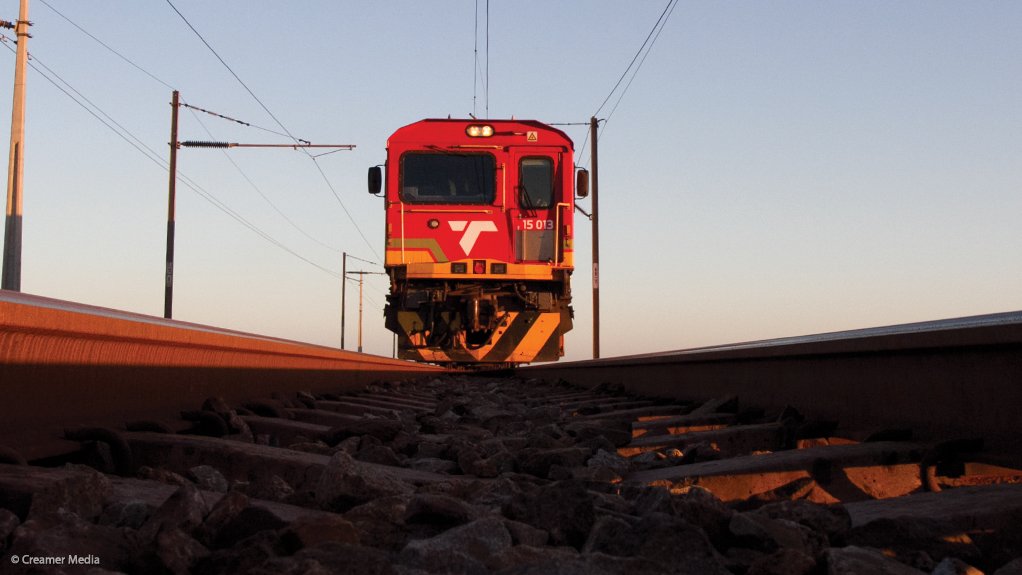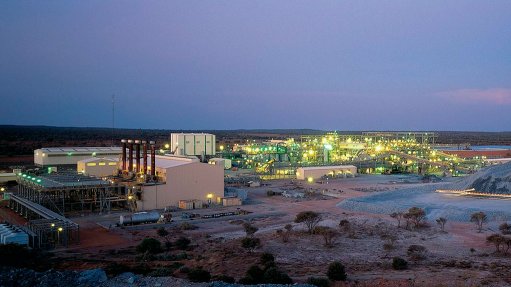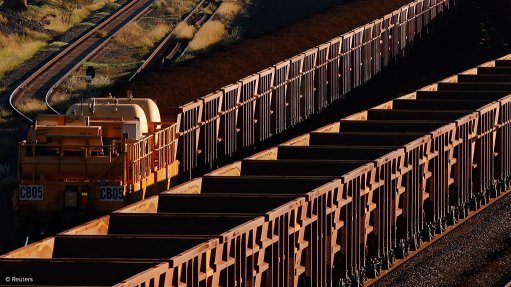Transnet reports recovery in some units, but still expects big Covid-19 revenue hit
State-owned freight logistics group Transnet reports that there has been a recovery in some of its operations since the easing of lockdown restrictions and is increasingly tending towards an “optimistic” recovery scenario for many of its units – a scenario that assumes a ramp-up to full operations by January 2021 and a revenue reduction of R6-billion for the financial year.
The scenario was one of three outlined by CEO Portia Derby during a presentation to lawmakers in early May, with the other two labelled as ‘realistic’ and ‘pessimistic’ and representing revenue reductions of greater than R14-billion for the year.
In 2018/19 the group reported revenue of R74-billion and in the interim period to September, its revenue was R38.7-billion. The group has not yet announced results for 2019/20.
Transnet stresses, however, that none of its divisions has emerged unscathed and tells Engineering News & Mining Weekly that it is still using its ‘realistic scenario’ as a guide for reprioritisation for its operating divisions during the current phase of the Covid-19 crisis.
Having been declared an essential service on March 28, Transnet was able to operate with an average 50% of operational staff deployed, enabling it to meet demand from mining companies approved to operate by the Department of Mineral Resources and Energy during the initial phase of the lockdown.
Following the transition to Level 4, some divisions have bounced back, with Transnet Freight Rail achieving 87% of its pre-lockdown plan in the second last week of May, compared to 34% in the first week of the lockdown. A further ramp-up is likely under Level 3.
Some operating divisions continue to be constrained by slow demand, including Transnet Pipelines, which transports petroleum products and which is currently 60% below plan for the full lockdown period.
Transnet insists that all blockages at the ports have been cleared since the challenge of moving essential and nonessential goods was resolved.
“This was helped by the approval for nonessential goods to be moved to bonded warehouses in Gauteng.”
It also reports that the truck-booking system implemented during the lockdown has led to a significant improvement in congestion outside the Port of Durban, especially congestion on Bayhead road.
“The truck booking system is now fully implemented and it is a permanent feature. This has greatly improved the overall system efficiency.”
Derby told lawmakers that priority is being given to addressing problems with the performance of the ports operator highlighted in a World Bank diagnostic report, based on an investigation of the performance of the container terminals in Durban.
The World Bank team found that operational efficiency is well below the level of top performing ports and identified steps that should be taken to address the problems.
Transnet reports that it is in the process of purchasing new equipment, hiring additional operations staff and increasing maintenance of existing equipment to deliver better reliability and efficiency. “We have also strengthened management at the terminal level and improved the range of commercial and operations decisions that they can make.”
Improvements have already been reported in key measures of efficiency, including ship-waiting time, ship turnaround time, truck waiting time and rail turnaround time.
“Between January and March 2020 for Durban Container Terminal, crane moves per hour and moves per ship working hour increased by 5% and 6% respectively while the average ship waiting time decreased by 61%.”
Transnet has also formed a Decongestion Task Team for the Port of Durban that comprises representatives from the Department of Public Enterprise, shipping lines, the tucking fraternity, eThekwini municipality, KwaZulu-Natal provincial government , organised labour and business, including the Durban Chamber of Commerce and Industry, depot operators and other industry associations and bodies.
The decongestion team has agreed to a number of initiatives aimed at improving the flow of containers into and out of the port, including accelerating the expansion of Bayhead road.
Urgent attention was currently being given to identifying depot operators that can operate on a 24/7 basis so as to ensure a continuous flow between the port and depots, so as to address the peaks currently experienced during normal working hours.
In parallel, Transnet is assessing ways to fully align the Transnet National Ports Authority (TNPA), which acts as the landlord across all of South Africa’s commercial ports, with the National Ports Act of 2005.
The model currently favoured is the incorporation of the TNPA as a wholly owned and fully consolidated subsidiary of the Transnet Group.
“Key steps that need to be completed ahead of the corporatisation include consultations with labour, funders, policy departments and regulators to ensure that the competitiveness of the ports and the financial sustainability of the Group – Transnet and TNPA – is not compromised.”
This process is expected to be finalised by the end of the 2020/21 financial year.
Comments
Press Office
Announcements
What's On
Subscribe to improve your user experience...
Option 1 (equivalent of R125 a month):
Receive a weekly copy of Creamer Media's Engineering News & Mining Weekly magazine
(print copy for those in South Africa and e-magazine for those outside of South Africa)
Receive daily email newsletters
Access to full search results
Access archive of magazine back copies
Access to Projects in Progress
Access to ONE Research Report of your choice in PDF format
Option 2 (equivalent of R375 a month):
All benefits from Option 1
PLUS
Access to Creamer Media's Research Channel Africa for ALL Research Reports, in PDF format, on various industrial and mining sectors
including Electricity; Water; Energy Transition; Hydrogen; Roads, Rail and Ports; Coal; Gold; Platinum; Battery Metals; etc.
Already a subscriber?
Forgotten your password?
Receive weekly copy of Creamer Media's Engineering News & Mining Weekly magazine (print copy for those in South Africa and e-magazine for those outside of South Africa)
➕
Recieve daily email newsletters
➕
Access to full search results
➕
Access archive of magazine back copies
➕
Access to Projects in Progress
➕
Access to ONE Research Report of your choice in PDF format
RESEARCH CHANNEL AFRICA
R4500 (equivalent of R375 a month)
SUBSCRIBEAll benefits from Option 1
➕
Access to Creamer Media's Research Channel Africa for ALL Research Reports on various industrial and mining sectors, in PDF format, including on:
Electricity
➕
Water
➕
Energy Transition
➕
Hydrogen
➕
Roads, Rail and Ports
➕
Coal
➕
Gold
➕
Platinum
➕
Battery Metals
➕
etc.
Receive all benefits from Option 1 or Option 2 delivered to numerous people at your company
➕
Multiple User names and Passwords for simultaneous log-ins
➕
Intranet integration access to all in your organisation





















